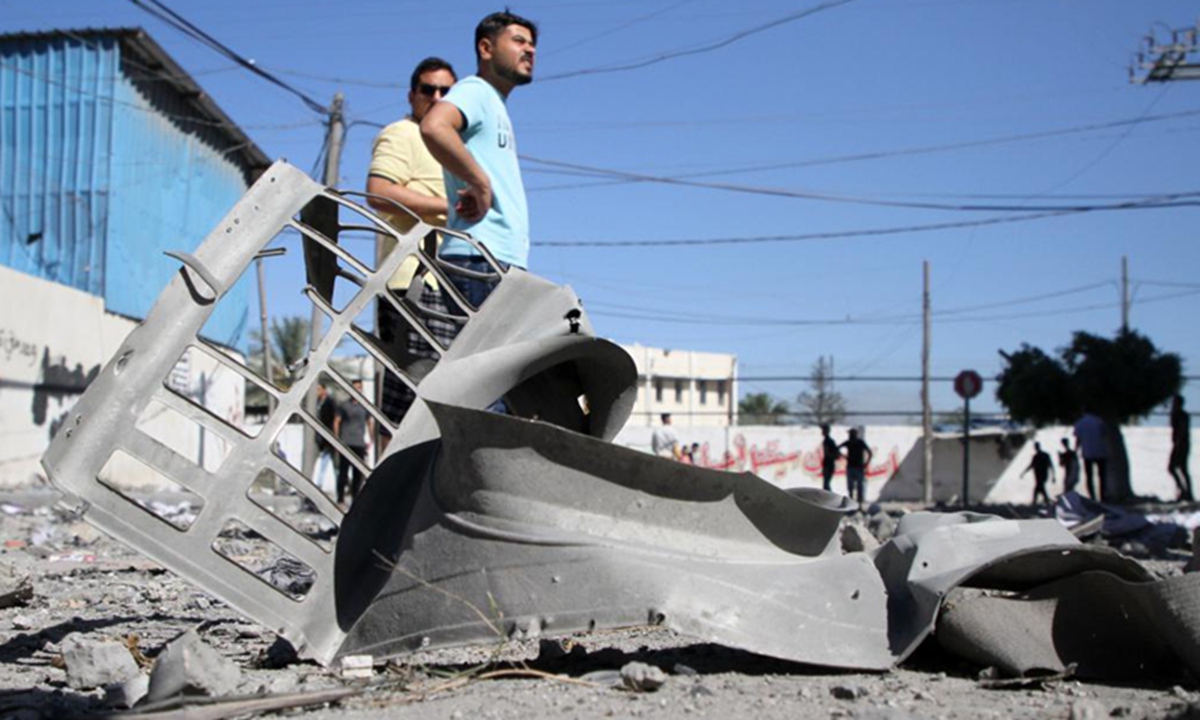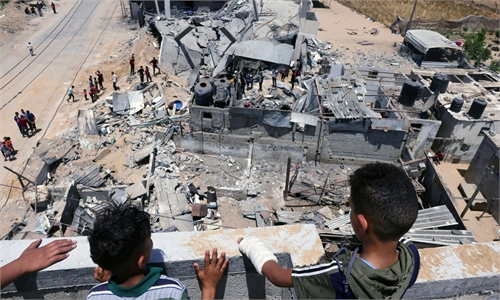Important for US, West to help improve Palestinians’ lives, resolve conflict: Global Times editorial

Palestinians check rubbles of Jala Tower, which housed offices of Al-Jazeera TV and Associated Press as well as residential apartments, after it was hit by an Israeli airstrike in Gaza City, on May 15. Israel said Saturday it struck the high-rise building in Gaza City housing offices of international media outlets because it contained assets of Hamas intelligence agency. Photo: Xinhua
Israel bombed a 13-story building in the Gaza Strip on Saturday, claiming it contained assets of Hamas intelligence agency. The building housed the offices of news organizations including Al Jazeera and The Associated Press (AP). Although a warning was provided to the building's occupants one hour in advance by the Israeli side to allow people to evacuate in time, the bombing still aroused opposition in public opinion worldwide.
The AP's President and CEO, Gary Pruitt, said "We are shocked and horrified." Al Jazeera published a statement which said the media outlet "promises to pursue every available route to hold the Israeli government responsible for its actions."
The latest conflict continues to rapidly escalate between Israel and Hamas. Both sides are sticking to their own argument over how the conflict started. The international community is well aware that despite the details concerning the trigger are complicated, the deeper cause is that the Palestinian issue has not yet been fairly resolved, and the two-state solution, backed by the UN, has not yet been implemented. Hopes of realizing the solution are slim. Under the circumstances, the stability of the region can only be temporary and any incident could light the touch paper of a new round of political tensions.
The Palestinian issue has been gradually marginalized within the Arab world. Many Arab countries have improved their relations and even established diplomatic relations with Israel. Their official support for Palestine has gradually declined. The Trump administration made a big move when it moved the US embassy from Tel Aviv to Jerusalem, and these countries are OK with it. It shows that Palestinians are losing the power to fight back against forceful behavior that squeezes their rights.
However, human hearts are connected with morality and justice. Generally speaking, Palestinians are the ones that are being bullied. Their collective rights have been violated, and many people are living a miserable life. This is the basic understanding of the international community when it views Israeli-Palestinian conflicts, and this understanding has not changed. As a result, the global community has a sense of compassion toward Palestine, which has continued to influence the attitude of quite a few countries, including those in Europe, on Middle East issues.
Perhaps there is a logic that Israel wants to emphasize in each of its strikes against Hamas. But it is clear that their counterattacks have gone too far, because most of the consequences of their punishment of Hamas have been borne by Palestinian civilians. And it is reasonable to assume that this disproportionate punishment is done to intimidate all Palestinians, destroy their will to fight back and force them to accept Israel's arbitrary handling of affairs in its occupied territories in violation of UN resolutions.
The Palestine issue mirrors the US' attitude toward Muslims most precisely. The Palestinian-Israeli conflict is taking place in the heart of an area where the history of Western and Islamic civilizations overlaps, and Israel's encroachment on East Jerusalem is unlikely to be accepted by the wider Islamic world. Even if some Islamic countries temporarily have softened their attitudes due to realistic political considerations, the boycott will continue in the Islamic civil society. The US promotes Palestinian-Israeli peace talks, but it will always stand by Israel as long as it has to choose between the two. Washington has consistently condemned attacks on Israeli targets by Hamas and other organizations, while it keeps downplaying Israel's massive strikes on Palestinian targets that have caused disproportionate casualties. It shows how hypocritical the US is.
Take a look at the US' high-profile claims over its fabricated allegation on China's Xinjiang affairs and its claimed commitments on protecting the human rights of Muslims. Then take a look at the US-launched war in the Middle East that killed a large number of Muslim civilians, and US indulgence toward Israel over killing and suppressing Palestinian Muslims. Washington's hypocrisy can hardly be concealed.
The US is the only country that can truly influence Israel, but its ability to restrain Israel's behavior is obviously not enough considering Israel's suppression and discrimination against the Palestinians. Many of the places where human rights suffer the most fundamental damage in the world today are in the Middle East, and the deterioration of human rights in those places is more or less related to the US' acts. Washington has kept chanting about the so-called human rights, but in fact, it is the one who is most responsible for the deterioration of human rights worldwide.
We hope the latest tragedy at the heart of the Israeli-Palestinian conflict will end as soon as possible, and both Hamas and Israel will exercise restraint. We also hope that the world will pay attention to the fate of the Palestinians, whose lives are equally precious. The US and other Western countries are able to exert influence on the improvement of their lives, and they should not refrain from doing it. Moreover, the issues involved are far from trivial.



